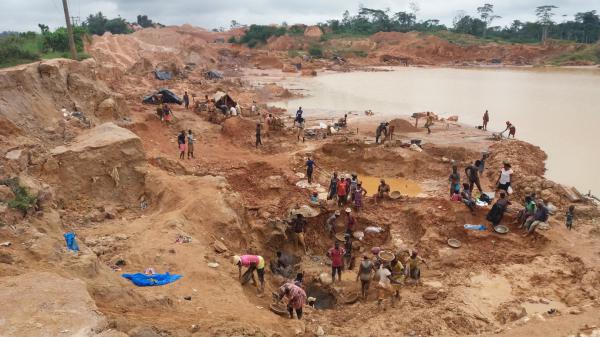Villagers in Chimanimani, Chiadzwa and Penhalonga districts have raised concerns over illegal artisanal mining activities in the areas which have left uncovered pits that are death traps for both humans and livestock.
The pits have also become fertile breeding areas for mosquitoes during the rainy season.
Apart from that the miners were using chemicals that are harmful to animal and plant life.
“The open pits being left behind have become death traps for our livestock. Locals have lost hundreds of their cattle, goats, donkeys and even sheep.
“This year alone we have recorded eight human deaths. Most of these are drowning as the pits are now filled with water,” the Amalgamated Chiadzwa Community Development Trust vice chairperson, Jey Kasakara, told Business Times.
He said a new challenge has also emerged in the pits being mosquito breeding sites.
He added: “Our area has become a hotbed for malaria, something that was unheard of prior to this mining venture that began in 2007.”
The Environmental Health technician with the Ministry of Health and Child Care stationed at Chishingwi Clinic in Marange, Mavis Chanakira, said malaria cases had shot up in Chiadzwa, in Marange district.
“We have made the random surveys and they proved that Marange (district) had become one area that is a malaria zone. This can be easily traced or linked to the huge open pits left behind by mining firms and artisanal diamond panners that are abundant in the area,” Chanakira said.
She added: “Had these pits been filled up we are sure the cases of malaria would not be as high as they are in the area at the moment.
“Our appeal is for the provision of mosquito nets to the communities around the areas with these pits to control mosquito bites and ultimately malaria.”
Kudzai Mlambo from Chimanimani said the illegal gold panners were encroaching into the fields of locals as they seek the precious mineral.
“We have seen some families losing their houses as the underground gold mining takes root. Others have lost their fields as the marauding gold panners stop at nothing to get the gold at any cost and stop at nothing,” Mlambo said.
At Fairview Farm in Mutasa district, commercial farmer Felix Kamba said nearby farmers had lost vast pastureland to the illegal gold processing being done on his property by the illegal gold miners from Tsvingwe in Penhalonga through contamination of the land and dam water.
“The mining is not being done on the property, but the processing of the gold where they use their hammer mills and cyanide and mercury is what is affecting me and other neighbouring farmers. These chemicals they use on our properties are causing havoc on the farm. The cyanide and mercury have polluted the water and destroyed the grazing land,” Kamba said.
He added: “The gold dealers just invaded the farm and set up their hammer mills. The noise pollution from that is unbearable, the pollution levels on the dam are unimaginable, we are thinking of abandoning our dairy project we had set up at the farm as pollution levels are escalating. Soil has been contaminated as well as the water bodies.”
The Manicaland Provincial Mines and Mining Development director Ernest Mugandani told Business Times that proper and safe ways of mining needed to be adhered to at all times to safeguard the environment. He said those involved in mining activities should not endanger human, animal and plant life while carrying out their activities.
“We keep on saying mining should be smart and we will always say it again and again. We advise the reclamation of once mined areas to be used for other purposes such as agricultural use. Open pits need to be fenced off or filled up. We want our people to be economically empowered while at the same time we leave peacefully with surrounding communities,” Mugandani said.
“Our supervisors are always on the ground to look at these grievances coming from the communities. We do not want them to lose their livestock from these open pits or from cyanide poisoning.
The Zimbabwe Miners Federation Manicaland Province representative Judith Shadaya whose members have been largely blamed for the environmental degradation said the organisation has embarked on a provincial awareness campaign on safe methods of mining with minimal damage to the environment.
“As an organisation we are currently going around mining areas to educate our membership on the best practices of mining,” Shadaya said.
James Mupfumi, director for Centre for Research and Development said it was critical to push the agenda for the speedy enactment of the Mines and Minerals Amendment Bill into law.
“We want the laws to be passed such as the Mines and Minerals Amendment Bill, the Devolution and others as we realised that there is a lot of lawlessness going on in Chiadzwa, Chimanimani and Tsvingwe in Penhalonga. The absence of the implementation of such laws is impacting negatively on the people,” Mupfumi said.

